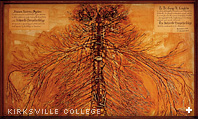Post
What of the Soul?
I received a question recently that asked what I thought about the existence of a soul given the relative secularity of most of the content on this site. Soul, Mind, whatever you call it refers generally to the experiences of consciousness and self. For materialists, the properties of the mind are purely physical ones dependent on the physical brain and subject to the usual laws of nature. For dualists, the soul is immaterial and its properties are non-physical.

I tend to favor the former position, but if the properties of the mind are physical where did they come from? As I’ve learned more about the structure and function of the nervous system, I’ve been trying to understand it in the context of evolution. Appending a “why” to every fact has helped me formulate at least a conceivable scenario for the emergence of Mind. Here’s what I think (and it’s purely speculative):
Organisms first developed basic reflexes: move towards nourishment and flee from danger. As they evolved, so did these reflexes, which soon involved nerves and clusters called ganglia. Eventually, these organisms began to consolidate these controlling elements into a larger, central brain. In a primitive form like amphioxus, the early nervous system coordinates only crude senses and a few reflexes. It lacks both the need and anatomy for a complex Mind. But what happens when you put the reins to an elegant animal in a big bundle? These bundles now control the organism’s entire muscular system, autonomously manage its internal functions, and continue to develop more complex reflexes and behaviors. This now proper nervous system becomes the command center for a very complex machine.

These higher animals required a way to quickly and accurately coordinate sensory input and motor output. More importantly, organisms that were able to interpret this information in relation to themselves were at a distinct advantage. Have you noticed how our bodies seem to fit like a glove? Our entire form seems to be penetrated by an immaterial substance such that moving a limb is just a matter of willing that motion from within. I posit that this apparently immaterial force is an advanced mechanism for controlling the body, a mechanism that allows for incredibly precise control through the activities of the central and peripheral nervous systems. This is the Self.
Ask me not how it learned to reason. The last 50,000 years have seen minimal changes in the brain, and in the meantime we’ve developed language, culture, technology and everything else associated with the modern man. This cultural evolution worked much more rapidly and employed the faculties of the enlarged forebrain to develop these advanced functions. We’re very far from understanding how our brain does all these things, but it does do them, it is the seat of the Soul.
Archive
-
260.
The Ethics of Practicing Procedures on the Nearly Dead
The report from the field was not promising by any stretch, extensive trauma, and perhaps most importantly unknown “downtime” (referencing the period where the patient received no basic care like...
-
260.
The Ethics of Teaching Hospitals
I can’t imagine what the patient was thinking. Seeing my trembling hands approaching the lacerations on his face with a sharp needle. I tried to reassure him that I knew what I was doing, but the...
-
260.
Conscious Conversation: Behavioral Science
Dr. Eran Zaidel is a professor of Behavioral Neuroscience and faculty member at the Brain Research Institute at UCLA. His work focuses on hemispheric specialization and interhemispheric interaction...
-
260.
Progress Report
Two years down, I’m still going. The next two years are my clinical rotations, the actual hands-on training. It’s a scary prospect, responsibilities and such; but it’s equally exciting, after...
-
260.
Why Medical School Should Be Free
There’s a lot of really great doctors out there, but unfortunately, there’s also some bad ones. That’s a problem we don’t need to have, and I think it’s caused by some problems with the...
-
260.
The Cerebellum: a model for learning in the brain
I know, it’s been a while. Busy is no excuse though, as it is becoming clear that writing for erraticwisdom was an important part of exercising certain parts of my brain that I have neglected...
-
260.
Conscious Conversation: Philosophy
Daniel Black, author of Erectlocution, was kind enough to chat with me one day and we had a great discussion – have a listen.
-
260.
The Stuff in Between
I’m actually almost normal when not agonizing over robot production details, and quite a bit has happened since I last wrote an update. First, I’ve finally graduated. I had a bit of a...



Comments
it seems u have not analysed the whole concept regarding soul and self in its totality;your approach seems bit unidimensional.any way your speculative approach is intersting.thamks sir!
kreationz
Apr 10, 11:54 AM #
Hi kreationz,
What do you think I’ve missed? My goal was to analyze the subject in terms of evolution, so it may have been a bit focused in that regard, but what did you have in mind?
Thame
Apr 18, 02:53 PM #
Hello there,
An interesting piece which surprised me in many ways.
It may be worth considering what the assertion of the existence of soul claims as a given. I don’t mean to complicate this, however as I understand it, the idea of soul claims an independent autonomous self determined entity. This would mean that a soul thus described would be the only separated objects in our known Universe.
Is this what you understand as soul? and if it is who or what separates soul from everything else.
Be Well
tony o
TonyO
May 7, 01:22 AM #
Thame, As I understand your speculations and the preseeding comments is it safe for me to assume that you are suggesting the human sould to be mechanistic and temporal rather than spiritual and eternal? if so what inferances do you speculate that this would have inregaurds to psycology, psychotherapy, general counsel, ect ? Would not the soul of a typical criminal then be able to be “reset” through some means to be more aligned with social mores?
Drew Hickok
May 8, 09:54 AM #
Hello Again,
It seems to me that I cannot define another human being simply as a criminal e.g. Nelson Mandela was criminal is he still?
If Nelson Mandela was a criminal and is not a criminal now it does not mean that he was in some way ‘reset’ in relationship to, the still undefined, soul. If only because the soul remains undefined.
I am not certain beyond change, however, I think mechanistic temporal objects are created by the culture and lexicon within which they arise they do not exist independently. No temporal object to my knowledge exists independent of the influence of gravity; indeed some might say that a relationship to gravity is part of what makes things temporal.
All temporal objects are by definition in relationship to other temporal objects and therefore interdependent.
I attempt here to point to what I think is a sound point of departure to examine the mystery in the question ‘what is soul?’ .
Be Well
TonyO
TonyO
May 12, 01:21 AM #
Hello:
it seems to me that you have only grazed the surface much like the image you used to introduce your thoughts. Once dissected would the image of man only be the sum of parts or is there some other binding that holds it together. The glue – what is the glue?
Although reasoned and fitting – physical evolution transmuting to neural evolution being a very interesting idea, I felt you had more to say but left the substance of “what of soul?” to be continued?
durand
May 31, 09:02 AM #
Just the sum of the parts. The glue is your body, the nerves, blood vessels, and muscles.
There is none, the soul is a product of the brain. I’d rather leave the issue to further examination than have to go through all the work for a soul.
Thame
Jun 1, 12:16 PM #
While restricting the conversation to science, my understanding of the self is that the brain has a ‘narrator’ section that coordinates all the sensory input (which, interestingly, arrives at slightly different times into the brain) to create a coherent experience/story to which the ‘self’ may respond as a coordinated whole. Part of the concept of the self, some hypothesize, is a united front abstracted from mirror neurons. That is, we learn who we are first because we can see the ‘whole’ of other people, and recognize we must have that ‘self’ too. Much of our understanding arises from our childhood as others respond to us, we recognize something internal is eliciting some behavior from others. We are learning about our subconscious via our conscious … via other people. The more self aware we are, of how and why we respond to others instinctively the way we do, provides grist for our logical minds to interpret our intuitive minds. The more a child receives a response from others to their internal needs, the more they recognize their internal responses as valid emotions. Part of our ‘soul’ as you define it, seems to arise from an interplay not just with environment, but with other ‘minds’ or ‘souls’. Neglected children, feral, orphans in poor conditions, become severely limited in their understanding of themselves.
C
Jul 2, 04:07 PM #
Add a Comment
Phrase modifiers:
_emphasis_
*strong*
__italic__
**bold**
??citation??
-
deleted text-@code@Block modifiers:
bq. Blockquote
p. Paragraph
Links:
"linktext":http://example.com